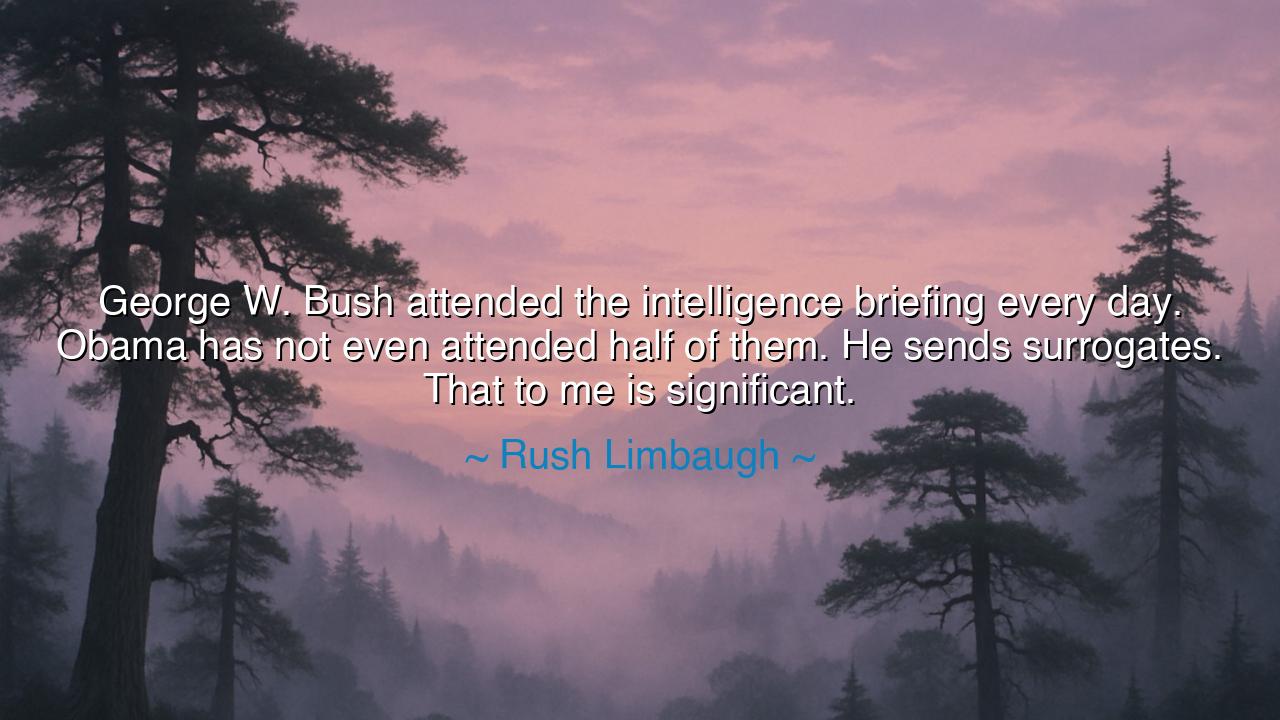
George W. Bush attended the intelligence briefing every day.
George W. Bush attended the intelligence briefing every day. Obama has not even attended half of them. He sends surrogates. That to me is significant.






The words of Rush Limbaugh, fierce voice of conviction and controversy, speak with the weight of judgment and the passion of a sentinel observing the deeds of kings: “George W. Bush attended the intelligence briefing every day. Obama has not even attended half of them. He sends surrogates. That to me is significant.” To some, these words may seem political; but beneath their surface lies a timeless truth about leadership, vigilance, and responsibility. For what Limbaugh laments is not merely the attendance of meetings—it is the presence of the leader’s mind, the sacred duty of one who bears the burden of a nation’s safety.
In the ancient days, when empires rose and fell beneath the gaze of the gods, the wise understood that a ruler must never turn his face away from the affairs of his realm. The king who ignored the whispers of his scouts invited his enemies to his gate. The general who trusted others to know what he himself should know risked ruin not from lack of power, but from lack of awareness. In this spirit, Limbaugh’s words strike at the heart of governance: to lead is not to delegate understanding, but to partake directly in knowledge, for knowledge is the lifeblood of wise action.
When George W. Bush sat in his daily intelligence briefings, it was not merely a ritual of politics, but an act of constancy—a symbol of engagement with the ever-shifting tides of danger and opportunity. To attend each briefing was to stand guard upon the wall, to show both his advisors and his enemies that he would not rule in ignorance. By contrast, when Barack Obama, as Limbaugh claimed, chose to send surrogates in his stead, the critic saw in it a weakening of that watchful spirit—a withdrawal from the sacred intimacy between leader and knowledge. Whether one agrees or not with Limbaugh’s view, his meaning is clear: that leadership demands presence, and absence, even if born of trust, carries the risk of blindness.
History offers its mirrors. Consider the story of King Darius of Persia, who once grew complacent in his vast power. Surrounded by courtiers and commanders, he ceased to seek reports himself, trusting that his ministers would bring him all he needed to know. But one night, while Darius feasted, his enemies crossed the river and struck deep into his lands. By the time the king was informed, his fate was sealed. The ancient chroniclers wrote that his downfall began not on the battlefield, but in the chamber where he chose not to listen. Thus, the lesson resounds through the ages: when the leader ceases to hear with his own ears, he begins to rule in echoes.
Limbaugh’s statement also carries the weight of symbolism. The intelligence briefing, in his eyes, is not just a meeting—it is the crucible of responsibility, the daily reckoning where power meets truth. To attend it is to face the world as it is, not as one wishes it to be. It is a ritual of humility, where even the mightiest must learn from others. The one who neglects it, even with the best of intentions, risks drifting into the dreamworld of abstraction, where ideals replace facts and perception becomes reality. Thus, Limbaugh’s frustration is not simply about politics—it is about presence versus distance, about the leader’s sacred duty to remain grounded in the reality of his people’s peril and hope.
Yet we must also see the deeper wisdom within the criticism: it reminds us that every human being is a leader in some form, whether over a nation, a family, or the course of their own life. We too have our “briefings”—moments when truth presents itself, demanding attention. Sometimes it is the quiet warning of conscience, or the hard counsel of a friend. If we ignore these daily messages—if we send “surrogates” to listen in our place, avoiding responsibility—then we, too, become blind rulers of our own destiny. The great lesson, therefore, is not only for presidents, but for all who walk the path of accountability: listen directly, learn continually, and engage fully with the truth before you act.
So let this teaching endure in your heart: to lead is to listen, and to listen is to honor the trust placed in you. Whether you command armies or simply the choices of your own life, do not delegate the duty of understanding. Be present in your learning, steadfast in your awareness, humble in your pursuit of truth. The wise ruler, the wise soul, does not hide from knowledge—he seeks it each day, for he knows that ignorance, once allowed to settle, becomes the silent architect of downfall.
Thus, as Rush Limbaugh’s words remind us, significance lies not in formality but in faithfulness—the faithfulness of the leader who shows up, the warrior who keeps watch, the soul who refuses to drift into complacency. The world belongs not to those who rule by title, but to those who rule by attention. Be among the latter, O listener. Attend your briefings—daily, faithfully, courageously. For in awareness lies wisdom, and in wisdom lies the safety of all that you are entrusted to protect.






AAdministratorAdministrator
Welcome, honored guests. Please leave a comment, we will respond soon